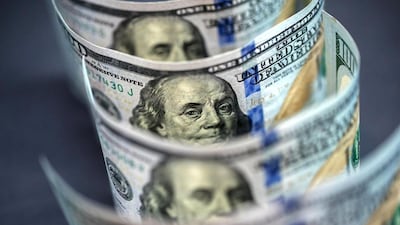The US dollar was on the defensive against most currencies on Friday after a rise in American jobless claims and a dip in Treasury yields dampened the appeal of holding the greenback.
The Chinese yuan jumped to a seven-month high against the dollar, showing that even the US-China diplomatic tension was not enough to deter traders who are bullish on China's economic outlook.
The euro, which has been the biggest beneficiary of a recent decline in the dollar, will come into focus later on Friday as traders brace for EU manufacturing data.
A larger-than-expected rise in weekly US jobless claims came a day after officials warned that a recovery in hiring is starting to slow, raising doubts about how quickly the world's largest economy will bounce back from the coronavirus.
Concern about the American economy, combined with an excess supply of dollars already in circulation, are likely to weigh on the US currency in coming weeks, analysts said.
"Sentiment for the dollar is weak," said Tsutomu Soma, a credit trader at Monex Securities.
"On the flip side, the euro is strong because Europe has already put a firm backstop in place to support economic growth, which has boosted confidence in the euro and euro-zone bonds."
The dollar stood at $1.1867 per euro on Friday in Asia following a 0.2 per cent decline. The dollar also nursed losses against the safe harbour Swiss franc, last trading at 0.9074 in Asia on Friday.
Meanwhile, hopes for a Covid-19 vaccine pushed Asian equities higher on Friday. Hong Kong rose 0.7 per cent, while Sydney went into the break 0.3 per cent higher and Shanghai gained 0.5 per cent.
Seoul jumped 1 per cent and Taipei rallied 1.5 per cent.
However, the disease continues to spread and is seeing a resurgence in Europe - just as the rate of new US cases appears to be easing - largely because of renewed travel, summer holidays and parties.
Despite this, the head of the World Health Organisation's European branch said new widespread lockdowns would not be needed.
"With the basic nationwide and additional targeted measures, we are in a much better position to stamp out these localised virus flare-ups," Hans Kluge said.
"We can manage the virus and keep the economy running and an education system in operation."
*with inputs from AFP

